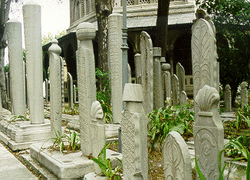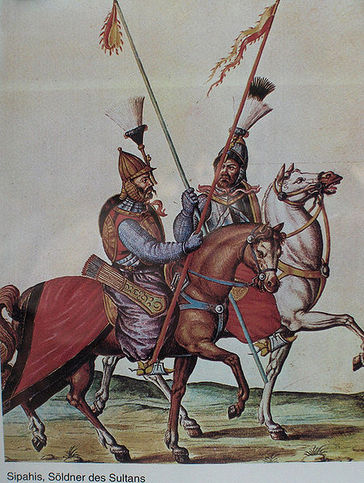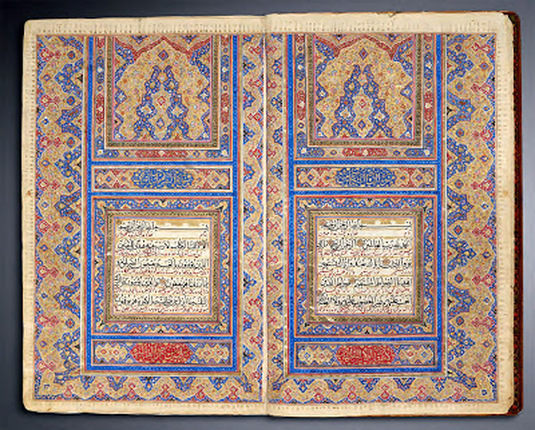The weather has been beautiful so far on our journey. The road was full of the great Sipahi, but nothing really happened worth relaying until we reached Ciorlu, where we lodged in a conac, or small seraglio. I did some serious exploring of all the women's apartments here, which are in the middle of a thick copse of trees, and found the walls to be covered with poetry, written by the women, little distiches penciled in by hand.
As we rode on we passed an ancient Greek church, which seemed pretty poorly built and less richly decorated than the Roman Catholic church, but the most celebrated Madonna in Italy could not be more famous for her miracles than this church!
We stayed that night at Bujuk Cekmege, or Great Bridge; and the next, at Kujuk Cekmege, or Little Bridge. We stayed in a former monastery that now belongs to a hogia or schoolmaster. I asked him to show me his own home, and he pointed to a treehouse he had built for himself and his family at the top of tall cypress! I wanted to take a closer look, but realized I'd probably break my neck on the climb.
Finally, we made it to Constantinople the next day; but I haven't had much time for exploring yet –I've had so many visits to make over the last few days. We are staying in Pera, (which is no more a suburb of Constantinople, than Westminster is a suburb to London).
We stayed that night at Bujuk Cekmege, or Great Bridge; and the next, at Kujuk Cekmege, or Little Bridge. We stayed in a former monastery that now belongs to a hogia or schoolmaster. I asked him to show me his own home, and he pointed to a treehouse he had built for himself and his family at the top of tall cypress! I wanted to take a closer look, but realized I'd probably break my neck on the climb.
Finally, we made it to Constantinople the next day; but I haven't had much time for exploring yet –I've had so many visits to make over the last few days. We are staying in Pera, (which is no more a suburb of Constantinople, than Westminster is a suburb to London).
 Cemetery on the grounds of the
Cemetery on the grounds of the Süleymaniye mosque
A certain French author says, Constantinople is twice the size of Paris. Mr W—— is claims its no bigger than London, though it looks bigger to me, but maybe not quite a populated. The cemeteries themselves are larger than the entire city, I've seen some a few miles long. No graves are ever moved and so land the size of villages becomes devoted to burying the dead. For each grave a pillar is set up and a turban indicating the profession or position of the person is carved into the top. Women have a simple pillar with no carvings or decorations, except those that died unmarried who have a rose at the top of the pillar.
When I wrote earlier about religion, there were a few things I forgot to mention but I wanted to discuss now because they seemed a little unbelievable to me. First, did you know that when a man divorces his wife he can get her back (legally) by simply permitting her to sleep with another man? I know some people who actually choose to do this rather than loose their love entirely. Second, I've learned that a woman who dies unmarried is believed to die in a state of reprobation. As a woman's purpose is to create and multiply, she is only doing what God expects when she is having or taking care of children.
Of course, our vulgar misconception that they believe women do not have souls if completely false, though women's souls are seen as inferior to men’s and unable to get into the same paradise reserved for them. There is a “place of happiness” dedicated entirely to the souls of the inferior where all good women may have eternal bliss. Many of the women are superstitious and are afraid to remain a widow for more a week for fear of dying in a useless state. Those that enjoy being free of a husband and are not as strict in their beliefs, just wait and marry when they start to become afraid of dying. This seems very different than the idea that nothing is more acceptable to God than a vow of constant virginity. I'll let you decide which is more traditional...
I can't tell you anything else yet, but once I've done some exploring, you'll hear from me!.
When I wrote earlier about religion, there were a few things I forgot to mention but I wanted to discuss now because they seemed a little unbelievable to me. First, did you know that when a man divorces his wife he can get her back (legally) by simply permitting her to sleep with another man? I know some people who actually choose to do this rather than loose their love entirely. Second, I've learned that a woman who dies unmarried is believed to die in a state of reprobation. As a woman's purpose is to create and multiply, she is only doing what God expects when she is having or taking care of children.
Of course, our vulgar misconception that they believe women do not have souls if completely false, though women's souls are seen as inferior to men’s and unable to get into the same paradise reserved for them. There is a “place of happiness” dedicated entirely to the souls of the inferior where all good women may have eternal bliss. Many of the women are superstitious and are afraid to remain a widow for more a week for fear of dying in a useless state. Those that enjoy being free of a husband and are not as strict in their beliefs, just wait and marry when they start to become afraid of dying. This seems very different than the idea that nothing is more acceptable to God than a vow of constant virginity. I'll let you decide which is more traditional...
I can't tell you anything else yet, but once I've done some exploring, you'll hear from me!.


 RSS Feed
RSS Feed